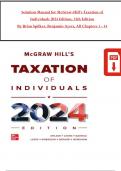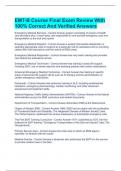Solution Manual for McGraw-Hill's Taxation of
Individuals 2024 Edition, 15th Edition
By Brian Spilker, Benjamin Ayers, All Chapters 1 - 14
,TABLE OF CONTENTS CY CY CY
Part I: Introduction to Taxation
CY CY CY CY
Chapter 1: An Introduction to Tax
CY CY CY CY CY
Chapter 2: Tax Compliance, the IRS, and Tax Authorities
CY CY CY CY CY CY CY CY
Chapter 3: Tax Planning Strategies and Related Limitations
CY CY CY CY CY CY CY
Part II: Basic Individual Taxation
CY CY CY CY
Chapter 4: Individual Income Tax Overview, Dependents, and Filing Status
CY CY CY CY CY CY CY CY CY
Chapter 5: Gross Income and Exclusions
CY CY CY CY CY
Chapter 6: Individual Deductions
CY CY CY
Chapter 7: Investments
CY CY
Chapter 8: Individual Income Tax Computation and Tax Credits
CY CY CY CY CY CY CY CY
Part III: Business-Related Transactions
CY CY CY
Chapter 9: Business Income, Deductions, and Accounting Methods
CY CY CY CY CY CY CY
Chapter 10: Property Acquisition and Cost Recovery
CY CY CY CY CY CY
Chapter 11: Property Dispositions
CY CY CY
Part IV: Specialized Topics
CY CY CY
Chapter 12: Compensation
CY CY
Chapter 13: Retirement Savings and Deferred Compensation
CY CY CY CY CY CY
Chapter 14: Tax Consequences of Home Ownership
CY CY CY CY CY CY
,Chapter 1 CY
An Introduction to Tax
CY CY CY
Discussion Questions CY
(1) [LO 1] Jessica’s friend Zachary once stated that he couldn’t understand why
CY CY CY CY CY CY CY CY CY CY CY
someone would take a tax course. Why is this a rather naïve view?
CY CY CY CY CY CY CY CY CY CY CY CY
Taxes are a part of everyday life and have a financial effect on many of the major personal decisions t
CY CY CY CY CY CY CY CY CY CY CY CY CY CY CY CY C Y CY CY
hat individuals face (e.g., investment decisions, evaluating alternative job offers, saving for educatio
CY CY CY CY CY CY C Y CY CY CY CY CY
n expenses, gift or estate planning, etc.).
CY CY CY CY CY CY
(2) [LO 1] What are some aspects of business that require knowledge of taxation? What
CY CY CY CY CY CY CY CY CY CY CY CY C Y
are some aspects of personal finance that require knowledge of taxation?
CY CY CY CY CY CY CY CY CY CY CY
Taxes play an important role in fundamental business decisions such as the following:
CY CY CY CY CY CY CY CY CY CY CY C Y
What organizational form should a business use?
CY CY CY CY CY CY
Where should the business locate? CY CY CY CY
How should business acquisitions be structured?
CY CY CY CY CY
How should the business compensate employees?
CY CY CY CY CY
What is the appropriate mix of debt and equity for the business?
CY CY CY CY CY CY CY CY CY CY CY
Should the business rent or own its equipment and property?
CY CY CY CY CY CY CY CY CY
How should the business distribute profits to its owners?
CY CY CY CY CY CY CY CY
One must consider all transaction costs (including taxes) to evaluate the merits of a transaction.
CY CY CY CY CY CY CY CY CY CY CY CY C Y CY
Common personal financial decisions that taxes influence include: choosing investments, retirement p
CY CY CY CY CY CY CY CY C Y CY CY
lanning, choosing to rent or buy a home, evaluating alternative job offers, saving for education expe
CY CY CY CY CY CY CY CY C Y CY CY CY CY CY CY
nses, and doing gift or estate planning.
CY CY CY CY CY C Y
(3) [LO 1] Describe some ways in which taxes affect the political process in the Unit
CY CY CY CY CY CY CY CY CY CY CY CY CY C Y
ed States. CY
U.S. presidential candidates often distinguish themselves from their opponents
CY CY CY CY CY CY CY CY
, based upon their tax rhetoric. Likewise, the major political parties generally have very diverse views o
CY CY CY CY CY CY CY CY CY CY CY C Y CY CY CY
f the appropriate way to tax the public. Determining who is taxed, what is taxed, and how much is t
CY CY CY CY CY CY CY CY CY CY C Y CY CY CY CY CY CY CY CY
axed are difficult questions. Voters must have a basic understanding of taxes to evaluate the merits of
CY CY CY CY CY C Y CY CY CY CY CY CY CY CY CY CY CY
alternative tax proposals offered by opposing political candidates and their political parties.
CY C Y CY CY CY CY CY CY CY CY CY
(4) [LO 2] Courtney recently received a speeding ticket on her way to the university. Her
CY CY CY CY CY CY CY CY CY CY CY CY CY C Y C
Yfine was $200. Is this considered a tax? Why or why not?
CY CY CY CY CY CY CY CY CY CY CY
The $200 speeding ticket is not considered a tax. Instead, it is considered a fine or penalty. Taxes
CY CY CY CY CY CY CY CY CY CY CY CY CY CY C Y CY CY
differ from fines and penalties because taxes are not intended to punish or prevent illegal behavio
CY CY CY CY CY CY CY CY CY CY C Y CY CY CY CY CY
r.
(5) [LO 2] Marlon and Latoya recently started building a house. They had to pay
CY CY CY CY CY CY CY CY CY CY CY CY CY
$300 to the county government for a building permit. Is the $300 payment a tax? Why
CY CY CY CY CY CY CY CY CY CY CY CY CY CY C Y CY
or why not? CY CY
The building permit is not considered a tax because $300 payment is directly linked to a benefit that
CY CY CY CY CY CY CY CY CY CY CY CY C Y CY CY CY CY C
they received (i.e., the ability to build a house).
Y CY CY CY CY CY CY CY CY
(6) [LO 2] To help pay for the city’s new stadium, the city of Birmingham recently enac
CY CY CY CY CY CY CY CY CY CY CY CY CY CY C Y
ted a 1 percent surcharge on hotel rooms. Is this a tax? Why or why not?
CY CY CY CY CY CY CY CY CY CY CY CY CY CY CY
The 1 percent surcharge is a tax. The 1 percent surcharge is an earmarked tax –
CY CY CY CY CY CY CY CY CY CY CY CY CY CY CY
i.e., collected for a specific purpose. The surcharge is considered a tax because the tax payments ma
C Y CY CY CY CY CY CY CY CY CY CY CY CY C Y CY CY CY
de by taxpayers do not directly relate to the specific benefit received by the taxpayers.
CY CY CY CY CY CY CY CY CY CY C Y CY CY CY
(7) [LO 2] As noted in Example 1-
CY CY CY CY CY CY
2, tolls, parking meter fees, and annual licensing fees are not considered taxes. Can y
CY CY CY CY CY CY CY C Y CY CY CY CY CY CY
ou identify other fees that are similar?
CY CY CY CY CY CY
There are several possible answers to this question. Some common examples include entrance fees to
CY CY CY CY CY CY CY CY CY CY C Y CY CY CY CY
national parks, tag fees paid to local/state government for automobiles, boats, etc.
CY CY CY CY CY CY CY C Y CY CY CY
(8) [LO 2] If the general objective of our tax system is to raise revenue, why does the inco
CY CY CY CY CY CY CY CY CY CY CY CY CY CY CY CY C Y
me tax allow deductions for charitable contributions and retirement plan contributions?
CY CY CY CY CY CY CY CY CY C Y
In addition to the general objective of raising revenue, Congress uses the federal tax system to encour
CY CY CY CY CY CY CY CY CY CY CY CY C Y CY CY CY
age certain behavior and discourage other behavior. The charitable contribution deduction is intende
CY CY CY CY CY CY CY C Y CY CY CY CY
d to encourage taxpayers to support the initiatives of charitable organizations, whereas deductions f
CY CY CY CY CY C Y CY CY CY CY CY CY CY
or retirement contributions are intended to encourage retirement savings. Another objective of the t
CY C Y CY CY CY CY CY CY CY CY CY C Y CY
ax system is to redistribute wealth.
CY CY CY CY CY






